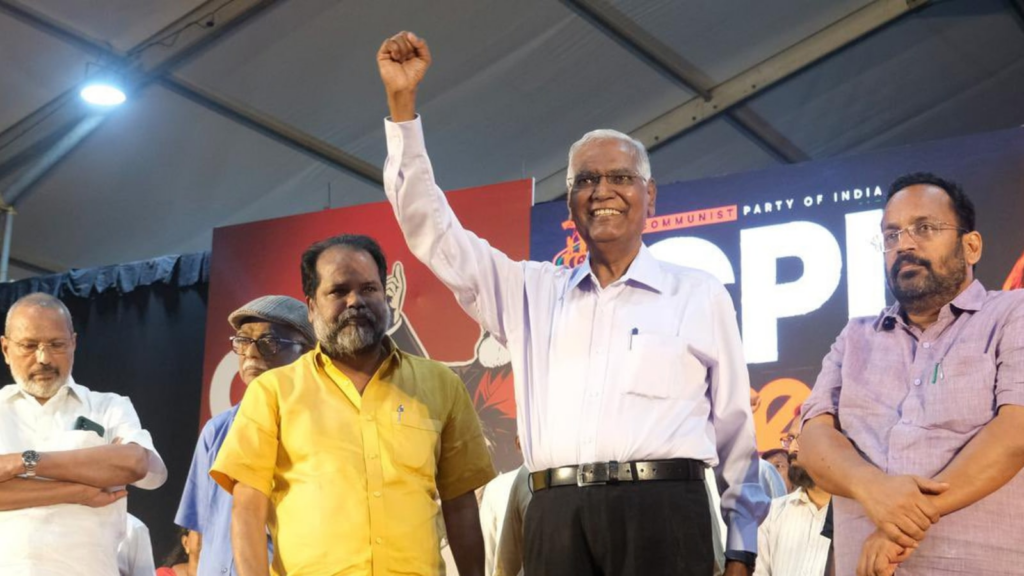Senior Communist leader D Raja was re-elected as general secretary of the CPI Thursday, overruling strong objections from the party’s Kerala and several smaller state units, which demanded that the 75-year age limit set by the party for those occupying leadership positions be adhered to without any exception. Raja turned 76 this year.
There were dramatic scenes on the last day of the 25th CPI Party Congress – a once-in-three years national conclave – which began in Chandigarh on September 21. Sources said the outgoing National Council, the highest authority between two party Congresses, decided Monday night to give an exemption to Raja and to let him continue as a member of the National Council. The overriding reason for the CPI, which is in its centenary year, was maintaining “continuity”.
K Narayana, who was elected as chairman of the Central Control Commission, is also above the age of 75.
Talking to reporters, Raja said the decision to choose him was “unanimous”. “It is a big responsibility… The party has such trust in me. It depends on how I am going to work confronting the emerging situation in the country, taking up the challenges from right-wing fascist, communal forces, which have become so aggressive.”
Earlier, when names of the new National Council and that of the Control Commission were presented at the Party Congress, some members publicly objected to the exemption for Raja. Sources said among those who took the lead were CPI leader from Kerala Rajaji Mathew Thomas and the party’s Delhi unit state secretary, Dinesh Varshney. Thomas is said to have even climbed onto the stage to register his protest.
The first Dalit leader to occupy the CPI top post, Raja came to the helm in 2019 when the then general secretary S Sudhakar Reddy resigned citing health reasons. He was then re-elected to the post by the Party Congress held in Vijayawada in 2022.
Earlier this year, the CPI(M) Party Congress held in Madurai saw the party strictly enforce the 75-year age limit norm, following which veterans like former general secretary Prakash Karat, Brinda Karat, Surjya Kanta Mishra, Subhashini Ali, Manik Sarkar and G Ramakrishnan stepped down from the party’s Politburo.
However, then too, an exception was made for Kerala Chief Minister Pinarayi Vijayan, who was allowed to continue in the Politburo. He is 79. The reason given was the state elections coming next year.
In the run-up to the CPI national conclave, there had been much debate over the leadership question. While the Kerala unit and some other smaller state units were keen that the age limit be applied strictly, some units from North India, including poll-bound Bihar, were said to be in favour of giving an exemption to Raja, the most visible face of the party in Delhi.
Among those whose names were floated as possible replacements were former Rajya Sabha MP and the CPI Kerala state secretary, Binoy Viswam, and AITUC general secretary Amarjeet Kaur. AITUC is the trade union arm of the CPI.
Had Kaur been elected, she would have been the first woman to head a Left party in India. As per sources, Viswam was keen to continue in Kerala in view of the Assembly elections next year.
The new 11-member National Secretariat of the CPI announced Thursday includes Kaur, apart from B C Kango, Prakash Babu, Pallab Veckat Reddy, Girish Sharma, and Ram Kishan Panda.
Among the resolutions adopted by the Party Congress were a demand for restoration of trade with Pakistan through the Wagah border and other routes in Punjab. A resolution moved by CPI Punjab State Secretary Bant Brar raised the “deterioration” in the present judicial system, and sought the release of prisoners who have completed their sentences. It stated that minority communities, particularly Sikh and Muslim prisoners, were treated unjustly.
The resolution also criticised the use of the UAPA and other draconian laws to imprison people.
A political resolution affirmed that at the international level, the CPI stands alone in advocating for an independent foreign policy.
CPI delegates also expressed concern over unemployment and “decline” in the education sector.
In his address, Raja said: “There are grave threats to the Constitution, democracy, the idea of federalism, the idea of social justice. We have to unite all secular, democratic parties and forces and put up a strong collective tight against the right-wing communal, fascist forces. This is a big task, a historic task.”

